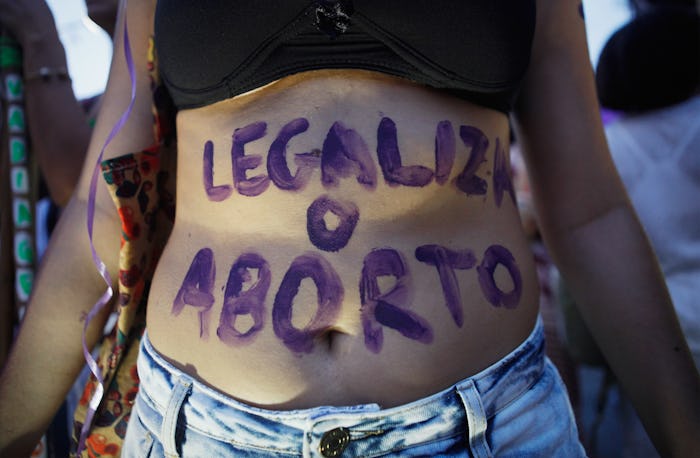Life

Stats On Illegal Abortion Abroad Are Important
Neil Gorsuch has officially been confirmed as a U.S. Supreme Court justice. After contentious debate and opposition on Capitol Hill, GOP leadership triggered the nuclear option to secure Gorsuch's confirmation. One thing Americans need to watch is what this means for Roe v. Wade. While Gorsuch acknowledged Roe v. Wade as the "law of the land" during his Senate confirmation hearings — because it is — the Trump administration may have other plans. But what if Roe v. Wade wasn't law of the land? We can see what life would be like from statistics on illegal abortion abroad, in places were abortion is against the law.
Even with Roe v. Wade protected and legal abortions, Gorsuch could still be the justice that makes it harder to get abortions in the United States, as his concurring opinion of Hobby Lobby's "religious freedom" rights demonstrated when he was a U.S. 10th Circuit judge. In that case, Gorsuch advanced factually incorrect statements about how birth control actually works, saying that it can end up "destroying a fertilized human egg."
During the third presidential debate, then-GOP candidate Donald Trump said he was pro-life, and would appoint pro-life judges if he became president. Earlier during his campaign, Trump told MSNBC's Chris Matthews "there has to be some form of punishment" for women who seek illegal abortions. It all seemed like such a crazy idea at the time, and yet here we are: 80 days into a Trump administration with a newly-confirmed conservative justice who has erred on the side of religious freedom before scientific fact.
Though untested on Roe v. Wade specifically, Gorsuch's confirmation to SCOTUS has taken a frightening closer step to undoing what is not just an American right — the right to reproductive choice — but a human one, as well.
According to the Center for Reproductive Rights, more than one-quarter of the world's population lives in countries where abortion is prohibited entirely, or only allowed in cases where the mother's life is in danger. The World Health Organization states that there are 21.6 million women who seek out unsafe abortions globally each year; of those women who do undergo unsafe abortions, 47,000 will die. Unsafe abortions can be performed anywhere, but they are seen in disproportionately higher numbers in nations where abortion is banned, prohibited, or restricted in some way. Perhaps the most staggering statistic regarding unsafe abortion from the WHO: Deaths from unsafe abortions account for 13 percent of all maternal deaths worldwide.
But you don't have to look across the globe to see the toll that illegal abortions take on women's lives: We can look right here at home. Abortions were illegal in the United States until the Supreme Court's historic ruling on Roe v. Wade in 1973. According to a comprehensive report by NARAL, the number of women having illegal abortions before Roe v. Wade was as many as 1.2 million women annually. And yet, President Trump thinks women should be punished for illegal abortions, but are these women deserving of death sentences? After abortions became legal, the abortion mortality rate dropped from 4.1 to 0.6 per 100,000 abortions between 1973 and 1997.
So here we are in 2017, where nearly half a century after Roe v. Wade, abortion is still legal and the Supreme Court bench is full with nine justices once more. But we can't get complacent, even if Gorsuch said Roe v. Wade is the "law of the land." The fact that Gorsuch is even sitting on the bench should make every American woman fearful for her own reproductive rights by the sheer virtue of how Gorsuch got there in the first place.
On Thursday and with just a few procedural votes, Senate Republicans just flushed years of legislative precedent down the toilet, paving the way for very real threats to the judicial balance of the SCOTUS bench. When Senate Majority Leader Sen. Mitch McConnell invoked the nuclear option, SCOTUS justices no longer needed to be confirmed with a three-fifths majority, or 60 Senate votes. A simple majority — just 51 votes — is all it takes now to confirm a Supreme Court justice.
With three justices on the bench near or in their 80s, there is the very real possibility that Trump could appoint those "two to three pro-life justices" he spoke of during his final presidential debate thanks to a Republican-controlled Senate. Of course, this assumes that Trump can last a full four years as president. But the Senate precedent to tilt the judicial balance of the Supreme Court towards anti-choice conservatism has been set — and will remain in place for every vacancy that crops up on the bench, no matter who's president.
With Gorsuch's confirmation to the Supreme Court, that also means that Americans can no longer assume that abortion will always be safe and legal here in the United States. As illegal abortion mortality rates from around the globe demonstrate — and even from our own country's history — women will indeed be punished for the audacity to have sovereignty over their own bodies and reproductive futures.